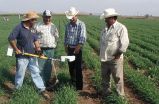(Press-News.org) While it is already known that breast cancer cells create the conditions for their own survival by communicating their needs to the healthy cells that surround them, Australian researchers have identified a new way of turning off that cellular cross talk.
They have shown that a molecule known as 'hedgehog' sits at the centre of the switchboard in breast cancer, transmitting biochemical signals between the cancer cells and healthy cells.
When this conversation is blocked – or hedgehog is 'silenced' – tumours shrink and stop their spread.
While the finding applies to all breast cancers, it is particularly relevant for women with basal breast cancer, for which there is no current targeted therapy.
The good news is that drugs for silencing hedgehog are already undergoing Phase 2 clinical trials in other cancer types.
Clinical Associate Professor Sandra O'Toole and Dr Alex Swarbrick, from Sydney's Garvan Institute of Medical Research, analysed breast tumour samples from a cohort of 279 women with advanced breast cancer, revealing that the higher the level of hedgehog, the more aggressive the cancer.
Having discovered high levels of hedgehog in some breast cancer patients, they went on to over-produce the protein in mouse models of basal breast cancer. Mice developed tumours that grew and spread through the body rapidly. When hedgehog was blocked, the tumour growth and spread were significantly slowed.
These findings are published in the prestigious international journal Cancer Research, now online.
"We are hopeful that our findings will drive the progress of clinical trials for anti-hedgehog drugs in breast cancer," said Dr Alex Swarbrick.
"Finding an effective drug target for basal breast cancer is a very high priority. It is often referred to as 'triple negative disease', because it doesn't produce any of the oestrogen, progesterone or HER2 receptors, targets of the drugs tamoxifen and Herceptin, which are very effective in other breast cancers."
A/Prof O'Toole, also a pathologist at Sydney's Royal Prince Alfred Hospital, undertook the study as part of her PhD. "These findings may provide some hope to the many women who succumb to breast cancer each year, especially the basal sub-type, although obviously it is early days," she said.
"More work in animal models is needed to understand exactly how best to block this pathway."
"Our study demonstrates that starving breast cancer cells of hedgehog significantly slows their growth and spread."
### END
Silencing a deadly conversation in breast cancer
2011-06-03
ELSE PRESS RELEASES FROM THIS DATE:
Adult brain requires MeCP2 for proper functioning
2011-06-03
A paper published online today in Science provides evidence that the Methyl-CpG-Binding Protein 2 (MeCP2) is required throughout life to maintain healthy brain function. The findings are reported from the Baylor College of Medicine lab of Huda Zoghbi, HHMI investigator and Director of the Jan and Dan Duncan Neurological Research Institute.
Mutations in MeCP2 cause the autism spectrum disorder Rett Syndrome, and have been seen in some cases of classic autism, childhood schizophrenia and milder neuropsychiatric conditions such as anxiety and learning disabilities.
Rett ...
BGI sequences genome of the deadly E. coli in Germany and reveals new super-toxic strain
2011-06-03
June 2nd, Shenzhen, China – The recent outbreak of an E. coli infection in Germany has resulted in serious concerns about the potential appearance of a new deadly strain of bacteria. In response to this situation, and immediately after the reports of deaths, the University Medical Centre Hamburg-Eppendorf and BGI-Shenzhen began working together to sequence the bacterium and assess its human health risk. BGI-Shenzhen has just completed the sequence and carried out a preliminary analysis that shows the current infection is caused by an entirely new super-toxic E. coli strain.
According ...
Exploring the deep biosphere
2011-06-03
About 20 years ago, the late Thomas Gold, in his landmark concept paper published in the Proceedings of the National Academy of Sciences of the United States of America, postulated that a "deep, hot biosphere" exists in the crust of the Earth [1]. Gold suggested that this biosphere is as deep as 6 km, and is supported by geological energy sources [2]. The Earth's "deep biosphere", as we know today, should include a variety of subsurface habitats, such as aquifers and sedimentary rocks in the continental regime, and sediments and igneous rock in the marine realm. ...
New sound synchronization technology holds the key to earlier diagnosis of heart disease
2011-06-03
Innovative UK technology is contributing to the development of a revolutionary digital stethoscope that could make it easier for GPs to spot the first signs of heart disease.
With Engineering and Physical Sciences Research Council (EPSRC) funding, a Queen Mary, University of London (QMUL) team has developed a computer-based technology that synchronises the various sounds collected by the new stethoscope and which make up a human heartbeat.
The sounds can then be analysed by an existing technique called ICA (independent component analysis), with data presented on a laptop ...
Microscopic worms could help open up travel into deep space
2011-06-03
A space flight by millions of microscopic worms could help us overcome the numerous threats posed to human health by space travel. The Caenorhabditis elegans (C. elegans) have also given experts an insight into how to block muscle degradation in the sick and elderly.
The worms — from The University of Nottingham — were flown into space onboard the Space Shuttle Atlantis. They spent 11 days in orbit onboard the International Space Station more than 200 miles above the earth.
Many of C. elegans' 20,000 genes perform the same functions as those in humans. Experts in human ...
Safer sex: Study examines sexual communication in transgender community
2011-06-03
A new study from North Carolina State University shows that talking about safer sex is a complicated process for individuals in the transgender community. The finding may help efforts to promote safer sex practices in a community facing high HIV rates – and also sheds light on broader questions related to safer sex for everyone.
"The main reason for this study is the fact that we're seeing evidence of devastatingly high HIV prevalence rates in the transgender community," says Dr. Kami Kosenko, an assistant professor of communication at NC State and lead author of the ...
Fraser Yachts Exclusive - Fairer Winds Expected this Summer
2011-06-03
As the Mediterranean prepares for the summer season the yacht brokerage market is looking fairly healthy in contrast to this quarter in recent years. Supporting this resurgence are the annual boat shows that are beginning to see increased interest and enquiries through their continued efforts.
Although all areas of the business are showing equal improvements this cannot be said to be spread across Fraser Yachts' entire network worldwide however with some regions recovering quicker than others it would seem.
Most recently interest appears to be concentrated in the ...
Cognitive impairment seen in preschool children with epilepsy
2011-06-03
A recent study has shown that cognitive impairment is evident early on in preschool children with epilepsy, consistent with results of similar studies in older children. Age of onset of first seizure is a significant predictor of cognitive impairment according to this study—the first to evaluate cognitive impairment in children age three to six. The report is available in Epilepsia, a journal published by Wiley-Blackwell on behalf of the International League Against Epilepsy (ILAE).
Epilepsy is characterized by recurrent seizures that range from mild staring spells to ...
The blame game in work-family conflict
2011-06-03
INDIANAPOLIS – When the demands of work and family conflict, is the job blamed, is the family role blamed or is blame placed on both? And what are the consequences?
A new study by Elizabeth M. Poposki, Ph.D., assistant professor of psychology in the School of Science at Indiana University-Purdue University Indianapolis, is the first to explore day-to-day experiences in attributing this type of blame. The work examines individual incidents of work-family conflict and tracks how blame for this conflict is attributed.
Only three percent of those surveyed blamed both work ...
Farmer networks hold key to agricultural innovation in developing countries, Stanford study finds
2011-06-03
New technologies can improve agricultural sustainability in developing countries, but only with the engagement of local farmers and the social and economic networks they depend on, say Stanford University researchers. Their findings are published in the May 23 online edition of the Proceedings of the National Academy of Sciences (PNAS).
"Most people tend to think that technology information flows to farmers through a direct pipeline from scientists, but that isn't true," said lead author Ellen McCullough, a former research fellow at Stanford's Program on Food Security ...

